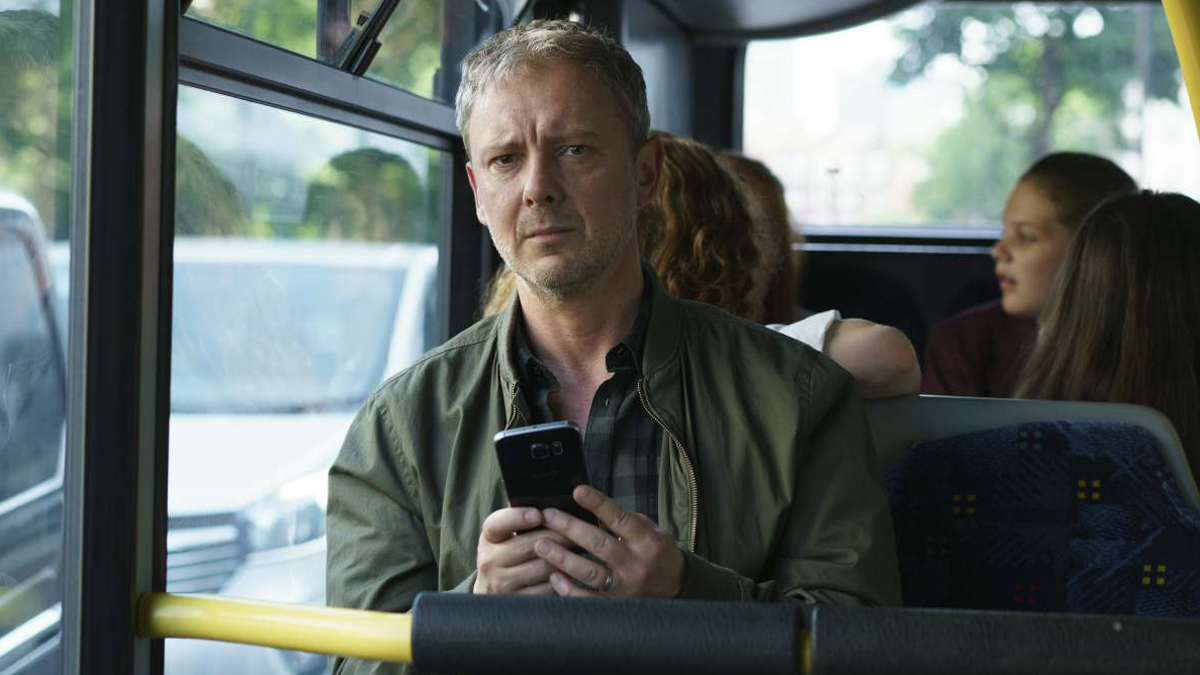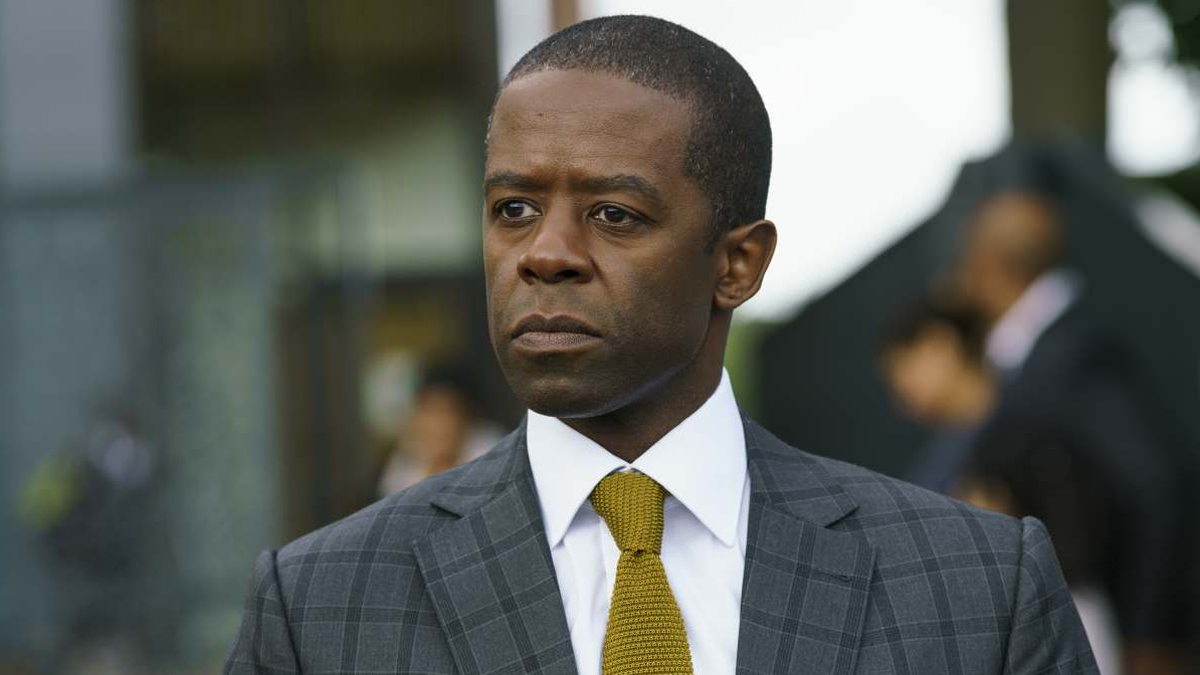Trauma interview: Mike Bartlett & John Simm on ITV thriller
3-part ITV drama Trauma airs on consecutive nights from tonight. We chatted to writer Mike Bartlett and actor John Simm…
Ten minutes into episode one of Trauma, a surgeon holds a boy’s heart between his gloved hands. It’s what surgeons do figuratively every day.
“When we enter a hospital,” says writer Mike Bartlett (Doctor Foster, King Charles III), “either you or your loved ones have to be put into the hands of complete strangers whom you have to trust one hundred per cent. You don’t do that in any other walk of life.” Buying a product or hiring any other service, he says, “we might get different quotes and find out about people. In a hospital, you don’t have time to do that. You’ve just got to go in and completely trust the person who says they know what they’re doing. That’s a very strange situation.”
Not wanting to be misinterpreted as an advocate for healthcare profiteers, he clarifies his point. “Thank goodness we have that system and we’re not shopping around! It’s absolutely the right way to do it, but what a strange thing.”
That strange thing provides the premise for Trauma, which stars Adrian Lester and John Simm as people at opposing ends of the same story. Lester plays John Allerton, Senior Trauma Surgeon at London Central Hospital. Simm plays Dan Bowker, a factory manager whose teenage son is stabbed in a street attack. John operates on Dan’s son, binding the two men together in a tale of revenge and the pursuit of justice.
Initially, the thriller was intended to be a medical drama set in a trauma centre, places with the expertise and high-tech resources to treat the most severe cases of injury. For research, Bartlett, who also serves as executive producer on the series, observed trauma surgeons at work. “You see these incredibly professional people dealing with some of the most horrific things you can imagine in such a brilliant way. You just thank God we’ve got them.”
Professional and brilliant are words Bartlett uses repeatedly to describe trauma surgeons as we chat, and there’s a good reason he might be keen to put an emphasis on praise. Trauma’s plot sees the professionalism and brilliance of surgeon John Allerton called into question. Dan Bowker, father of the stabbed child, becomes convinced that Allerton is hiding something, and sets about finding out exactly what that might be.
The idea stemmed from hospital research visits, when Bartlett realised that the real drama wasn’t confined to the surgical theatre, but also in the corridors and waiting rooms. “You walk down through the hospital, through the A&E and you see relatives waiting, and waiting a long time and getting frustrated with the system.”
That combination of perspectives—both the surgeon carrying out an operation and the frustrated, waiting relative—is the foundation of Trauma. “The perspective of the show shifts between those two characters. We’re with Dan one moment then we’re with John.” With whom your sympathies as a viewer lie, suggests Bartlett, “will completely depend on who you are, how you read it and what you relate to and who you believe. I think some people might be on the side of one character all the way through and some might change.”

“What’s clever about Mike Bartlett’s writing,” says actor John Simm, “is that you don’t know who’s in the wrong. It doesn’t seem like anybody is, but something has gone wrong and he doesn’t let you find out very easily. That’s how it turns into a pretty fast-paced thriller towards the end.”
Simm’s character Dan is driven by devastation, he says. “It’s the despair you go through when such a massive event happens in your life and trying to find who to blame. You put your trust in these professionals, and they tell you that everything’s going to be okay and then suddenly, everything’s changed. Who is to blame for that? Dan is convinced that he’s right, he’s convinced he’s being lied to.”
Dan’s conviction that his son was the victim of injustice becomes an obsession. “As a viewer,” says Simm, “you understand that he must be heartbroken and devastated, but surely, you think, he’s barking up the wrong tree here. Why isn’t he blaming the kid that stabbed him?”
It’s a good question. Why does Dan direct his ire at the man who tries to save his son? “It wasn’t the fact that he was attacked,” says Simm, “it was the fact that he was alive and while he was alive, the surgeon assured him that he was going to be fine, the way he spoke to him with that calming sort of voice they use when they’re trying to reassure people in hospitals. I think he takes umbrage with the fact that he did that to him and yet what happened happened.”
“Dan definitely blames the surgeon,” Simm continues. “He sees something in John’s eyes in episode one, when he finds himself in the operating theatre and John’s holding his son’s heart in his hand. That goes back to the trust we have to have in professionals, and institutions failing us. Dan sees something in John’s eyes and it looks to him like panic. He just can’t let it go.”

Whether or not John deserves Dan’s blame is the question Trauma hinges upon. “John isn’t a bad person,” says Simm. “He’s a brilliant surgeon and a brilliant father but everything is not as it seems. It’s about the little lies that we tell each other and ourselves really as well.”
The psychology of trauma surgeons, who work under intense pressure and deal with life and death situations, is what interests Bartlett. “Who is this man?,” he says. “What is his psychology?” asks Bartlett. “John seems almost too good to be true, so maybe he’s not true. Maybe there is something going on inside his head that he’s hiding. That’s one of the things that the show’s about.”
Class conflict is another. Episode one encourages comparison between the two men’s home lives, one upper middle class and comfortable, the other working class and financially stretched. The Allertons are both doctors with one privately educated daughter applying to a medical degree. Dan’s recently been made redundant, his wife works shifts in a supermarket and their son attends the same inner city state school as his attacker. We watch Dan arrive at the hospital by bus, and John in an expensive Audi.
“Dan feels very very much below John Allerton on the social scale,” says Simm. “He feels like a nobody.” In episode one, Dan bemoans his status, complaining that he wasn’t born “to the right people” and neither was his son. “There’s self-pity in there,” Simm says. “He’s frustrated. At another point he says something about this being different if this was David Beckham’s son, so he really does feel like a nobody. There’s a great sense of injustice in there.”
Dan channels that sense of injustice by going to some “extreme lengths,” says Simm. “He’s pretty tenacious and he will not let it go. He goes through all the proper channels. He tries to complain, he puts it to the hospital, he tries everything, but he just keeps getting the door slammed in his face.” As a result, “he becomes desperate. He does some extreme things. It’s a three-parter so I don’t want to give away the ending!”
Trauma is obviously a story about two men in conflict. Bartlett tells me he wasn’t deliberately trying to get across any ideas about masculinity or the way men can deal with shock and grief in the series, but it’s a theme he’s considered since writing it. When I spoke to them in January, both Bartlett and Simm had, coincidentally, just finished reading Robert Webb’s memoir How Not To Be A Boy.
“One of the things Webb talks about,” says Bartlett, “is how men are trained or tend to take any emotion and convert it to anger. Obviously, I read that book after I wrote trauma, so it’s not as though I was writing that, but looking at Dan as a character, you absolutely could see it. He’s experiencing all sorts of emotions he’s never experienced before and doesn’t know what they are and how to deal with them and it comes out in different ways.” Simm agrees, calling the idea “pretty relevant” to the character of Dan.
“On the other hand, to do a completely 180 perspective,” says Bartlett, “maybe [Dan’s] right and his pursuit of justice is absolutely what he should be doing because he owes it to his son. That’s sort of the fun of it in a way, if I can use the word ‘fun’ in inverted commas! You don’t quite know who in the show is in the right and who is not, that’s the joy of it.”
Trauma airs on three consecutive nights at 9pm on ITV starting on Monday the 12th of February.
